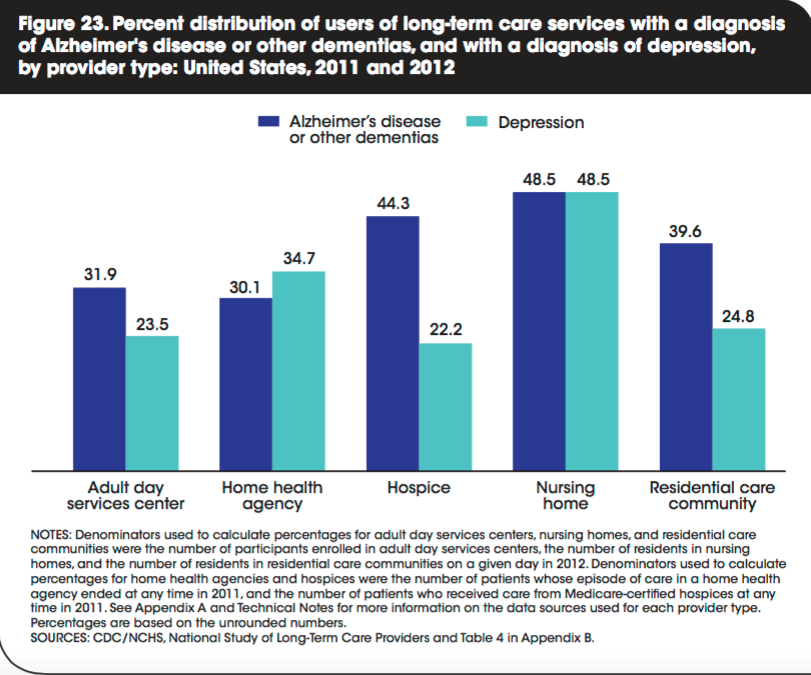One could argue that depression is only natural when your senses are dulled, your life has become much more about loss than gain, you no longer have a role that makes you necessary to others and you no longer live with family members. To top it off, you spend an inordinate amount of your time nudging your body to cooperate with the most basic of tasks, and your day's feature activity may be an exhausting, painful "tune-up" in physical therapy. And day in and day out, the sanitized chirpiness of busy, well-meaning staff members only punctuates the feeling that you are alone as you go down this last corridor of your life.
The reality that almost half of all nursing home residents are depressed might come as a surprise. Only half? What may be truly surprising is that geriatric experts find a large percentage of depressed elderly can be helped.
Maybe depression doesn't have to be accepted as natural after all.
Why is Grandma throwing her cane at that nice lady?
Depression, simply defined, is pervasive and constant sadness, but there are other signs to watch for, such as anger and aggression, increased pain, increased incontinence, weight loss, unexplained GI problems, lowered cognitive ability, fatigue, sleep disruption, and difficulty performing daily activities.
The mental health resources available in senior care facilities fall far short of the need. Blame Medicare and the shortage of geriatricians and psychiatrists - and accurately so. Even with sufficient resources, diagnosis in the elderly can be a confounding labyrinth. Stroke, vascular dementia and Alzheimer's are some of the common cognitive afflictions that mimic or overlap with depression. But efforts to untangle the web of symptoms and make the right diagnosis and drug or other therapies pay off, not just in improved mood, but in improved physical health as well.
Depression can kill more than motivation...
Everyone suspects that depression is probably bad for you, but this bad? A 50,000 resident analysis by The Canadian Institute for Health Information reported that the chances of dying are 1.5 to 2 times higher for elderly LTC residents with depression than for those without depression. The body's immune system is weakened with depression, lessening the ability to fight off bacteria, including superbugs. Depressed residents who are vulnerable to infection through bed sores, falls and skin that tears easily, are poorly positioned to win the superbug fight.
An ounce of prevention....
While our opening paragraph painted a dismal picture of nursing home life, there is much good news, and many of our clients are at the forefront of making it. In many of today's senior care facilities, there is more music, theater, more young visitors and pets. More busloads of seniors going to college lecture series, more hobbies cultivated, more coffee socials between residents with similar interests. More life and bustle that fill the day, challenge the mind and optimize the physical capabilities.
Promising therapies...
Significantly, senior care facilities are promoting modified physical exercise for people with varying degrees of mobility. From outdoor T'ai Chi sessions to pools with Hoyer lifts, the senior care industry is recognizing the benefits of enhanced balance, coordination, circulation and exertion for overall vitality and both physical and mental health.
For drug-resistant cases of major depression, transcranial magnetic stimulation (TMS), a new non-invasive technology that uses MRI technology to jump-start the mood regulation system, boasts a success record of 50% reduction in symptoms and a 30% remission rate. At The Ohio State University Wexner Medical Center, reported results are even better.
About the now....
In this day when people of all ages are flocking to yoga classes, meditation and mindfulness training to seek peace in the "now," it seems appropriate that we acknowledge, celebrate and enhance the "now" experience our elder residents have. Whatever our age and stage, depression does not necessarily have to be accepted as natural, with a shrug and a "Wouldn't you be?" Our seniors, like the rest of us, have today.
Let's make it a good one.
-1.png?width=292&height=64&name=LeaderStat%20Logo%20(4)-1.png)


-1.png?width=258&name=LeaderStat%20Logo%20(4)-1.png)